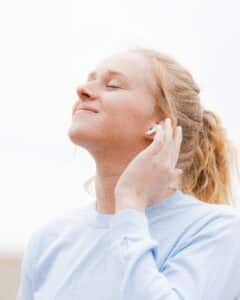Mental health and addiction often go hand in hand. In some cases, mental health symptoms are treated with drugs and alcohol. In other cases, the neurological changes brought about by a mental health condition encourage and reward harmful behavior like drug and alcohol consumption. If you are struggling with mental health and addiction, you can find treatment with dual diagnosis services.
Mental Health Disorders Associated with Addiction
There are several common mental health disorders associated with addiction. Symptoms are often managed or masked with sleeping pills, benzodiazepines, alcohol, and cocaine.
Depression
Depression is the most common mental health disorder that affects roughly half of adults around the world. Depression comes in many forms, like major depressive disorder, seasonal affective disorder, or postpartum depression. While the causes can be different, symptoms for the different types of depression are often the same:
- Mood changes like anxiety, discomfort, guilt, hopelessness, and apathy
- Problems with sleeping such as insomnia, restless sleep, excessive sleepiness
- Issues with eating
- Agitation
- Irritability
- Social isolation
- Loss of appetite
- Problems with concentration
- Excessive crying
- Severe weight gain or loss
- Repeatedly reviewing the same thoughts
PTSD
Post-traumatic stress disorder (PTSD) is a mental health disorder that manifests after exposure to traumatic events. Nearly a third of individuals will develop PTSD at some point in their lives after exposure to a minimum of one traumatic event, but often an average of two or three.
It is characterized by symptoms such as:
- Flashbacks
- Nightmares
- Insomnia
- Elevated resting adrenaline
- Hypervigilance
Anxiety
Anxiety disorders come in several forms and might be specific to phobias involving individual circumstances or items, social phobias, panic attacks, or generalized anxiety. Some examples of common symptoms include:
- Nervousness
- Restlessness
- Irritability
- Problems sleeping
- Sweating
- Shaking
- Headaches
- Pins and needles
Bipolar Disorder
Bipolar disorder is a mental health disorder that comes in several iterations, all of which are categorized by distinct manic or depressive episodes. These mood disorders are characterized by significant changes that can last weeks or months at a time without treatment.
The depressive episodes often look exactly like major depressive disorder symptoms, while the manic episodes are full of hyperactivity, elation, irritability, and irrational behavior.
Bipolar disorder is often misdiagnosed as depression. There are several reasons for this, but namely, people who struggle with bipolar disorder often seek medical treatment during a severe depressive episode, and as such, a doctor prescribes medication that helps deal with depression but not the converse manic episodes.
Without the right type of diagnosis or medication, individuals might think that their treatment isn’t working and turn to drugs and alcohol as a form of self-medication.
ADHD
ADHD is characterized as a mental health disorder where an individual struggles with symptoms from hyperactivity, inattention, or both.
There are several forms of medication for ADHD, but all forms of medication are more effective when used in conjunction with behavioral therapies and organizational skills. When individuals don’t get that, or they don’t get a diagnosis at all, they are more likely to struggle with mental health disorders associated with addiction because they self-medicate to cope with specific symptoms.
Schizophrenia
Schizophrenia is a psychotic mental health disorder that can involve hallucinations and delusions.
Several subcategories of schizophrenia are often misdiagnosed, like schizoaffective disorder. Individuals who don’t know they have a mental health condition or who have been misdiagnosed are more likely to struggle with mental health disorders associated with addiction because they self-medicate when symptoms arise.
Personality Disorders
There are actually three main categories and ten subtypes of personality disorders, but all of them have strong correlations between mental health and addiction, as individuals might be misdiagnosed or undiagnosed.
Dual Diagnosis Mental Health and Addiction Treatment
The best way to treat co-occurring mental health and addiction disorders is to use dual diagnosis services at Water Gap Wellness Center. Our facility provides top-of-the-line mental health services with outpatient treatment for addiction at the same time.
We offer several evidence-based therapies, including cognitive behavioral therapy, which can help you identify harmful automatic thoughts, or talk therapy, which can help address harmful behaviors. We also offer several forms of holistic care that can provide coping mechanisms for managing mental health disorder symptoms and overcoming cravings and triggers with addiction. Our care options include outpatient mental health services and our mental health intensive outpatient program.
Mental Health and Addiction Treatment at Water Gap Wellness Center
Mental health disorders and addiction often go hand in hand because people don’t have the correct diagnosis or they don’t have any diagnosis at all. In these cases, individuals are more likely to turn to drugs and alcohol to self-medicate, but with dual diagnosis services, you can find treatment. Contact Water Gap Wellness Center today to learn more about mental health and addiction. We are a Pennsylvania mental health program and treatment center offering individualized care.




